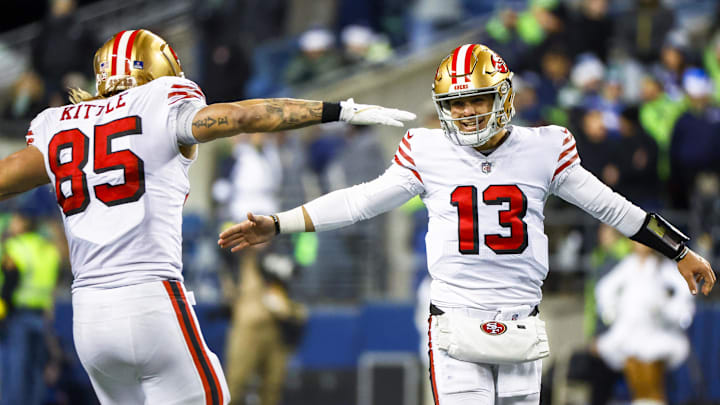The 49ers staved off a late Seahawks surge in Week 6, which indicates they've hopefully solved these five glaring issues.
It wasn't always easy, and there were certainly some nail-biting moments late in the game. But the San Francisco 49ers avoided falling to 0-3 within the NFC West by knocking off the Seattle Seahawks 36-24 on Thursday Night Football in Week 6.
The game marked a scoring high for the Niners thus far, suggesting head coach Kyle Shanahan's offense is getting back on track after a relatively slow start, although the complementary nature of football might dictate otherwise.
Still, after some troubling trends that accompanied a 2-3 start to the season entering the game, one can only hope Thursday's results are an indication San Francisco is finally starting to hit its stride.
Particularly by addressing these five problems that have plagued the team seemingly all year long.
Problem No. 1: Red-zone offense
Entering the week, the 49ers owned the fourth-worst red-zone offense, scoring touchdowns inside opponents' 20-yard lines a mere 40.9 percent of the time.
Early on Thursday, it appeared as if that trend would continue, as the Niners were forced to settle for field goals from newly signed kicker Matthew Wright instead of converting in the red zone.
However, by game's end, San Francisco was 3-of-5 in the red zone, thanks to a couple of touchdown grabs by tight end George Kittle and a last-minute rushing score by fullback Kyle Juszczyk that iced the affair.
Sure, the 49ers only climbed up to a 44.4-percent touchdown conversion rate, tied for 24th in the league with the remaining slate of Week 6 games to be played.
But, getting big-bodied targets like Kittle involved down by the goal line is a vital indication the red-zone woes are going away.
Problem No. 2: Pass protection
Entering Week 6, quarterback Brock Purdy had been sacked 12 times, which is about the league average for most starters but nevertheless indicated a relatively questionable offensive line, in terms of pass protection.
Even though all of those sacks weren't solely on the O-line, rather Purdy not getting rid of the ball fast enough, it was an area that needed to be addressed against a banged-up Seattle defensive front.
Well, as far as pass protection went, it was about as perfect as possible from a statistical vantage point.
Purdy wasn't sacked in the game, taking only four quarterback hits. While he regularly had to evade pressure, his mobility nevertheless allowed opportunities to extend plays while getting open, stifling the attempts from the Seahawks' defensive-minded head coach Mike Macdonald, who generated plenty of success against the signal-caller last season in a game against the Baltimore Ravens.
Problem No. 3: Protecting the ball
Directly related to Purdy being under pressure, both of his Week 5 interceptions thrown against Arizona were influenced by such. Tack on a late-game fumble by running back Jordan Mason, and there's yet another area in which inferior teams can win games.
Purdy didn't toss a pick against Seattle's defense, and only four passes were broken up over the course of the game.
More importantly, the Niners are trending back in the right direction in turnover differential, not committing a single one of their own while defensively forcing three separate takeaways from the Seahawks offense.
Problem No. 4: Run defense
Cardinals running back James Conner took over in the second half of Week 5, not only churning up yards but also forcing missed tackles in the process.
As a result, San Francisco finished that game with a season average of allowing 4.7 yards per carry, 21st in the league and a far cry from what this side of the ball wanted to limit.
Aiming to ground out the 49ers' depleted defense, Seattle hoped to utilize running back Kenneth Walker III to a great extent in prime time. Yet he was held to a mere 32 yards on 14 carries, averaging only 2.3 yards per attempt despite scoring the Hawks' lone rushing touchdown.
In total, the Niners defense held the Seahawks to just 52 yards on the ground, 2.6 yards per carry and now rank 12th by cutting their yards-allowed average down to 4.4.
Problem No. 5: Injury-related depth
Injuries have forced San Francisco to dive deep into its depth chart this season, perhaps the finest example being the emergence of running back Jordan Mason in the aftermath of Christian McCaffrey's season-to-date Achilles injury.
Yet Mason was one of several 49ers who either missed Thursday night's game outright or had to exit it early. Cornerback Charvarius Ward was a late scratch because of a knee issue, while safety Talanoa Hufanga was recently placed on injured reserve with a wrist injury suffered in Week 5. Kicker Jake Moody also suffered an injury in Week 5, too, mandating the Wright signing.
Wright went 3-of-3 on field-goal tries and made all of his extra-point attempts, while defensive backs Renardo Green and Malik Mustapha each recorded interceptions while filling in for Ward and Hufanga, respectively.
Rookie running back Isaac Guerendo's 78-yard scamper late in the fourth quarter helped alleviate Mason's departure, too.
Injuries certainly didn't hinder the Niners' efforts in Week 6 whatsoever.
